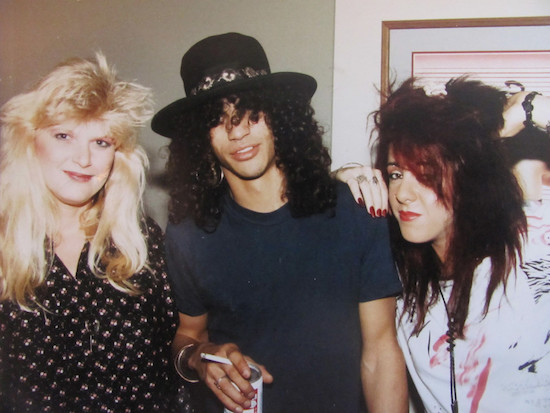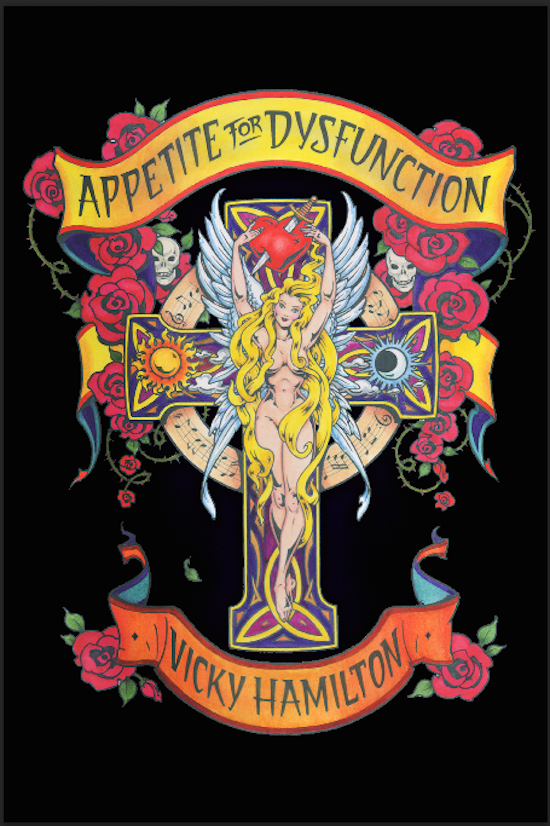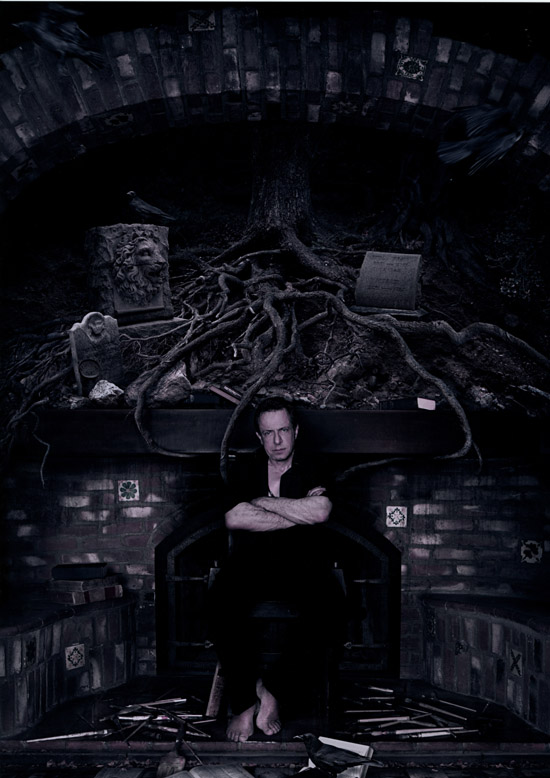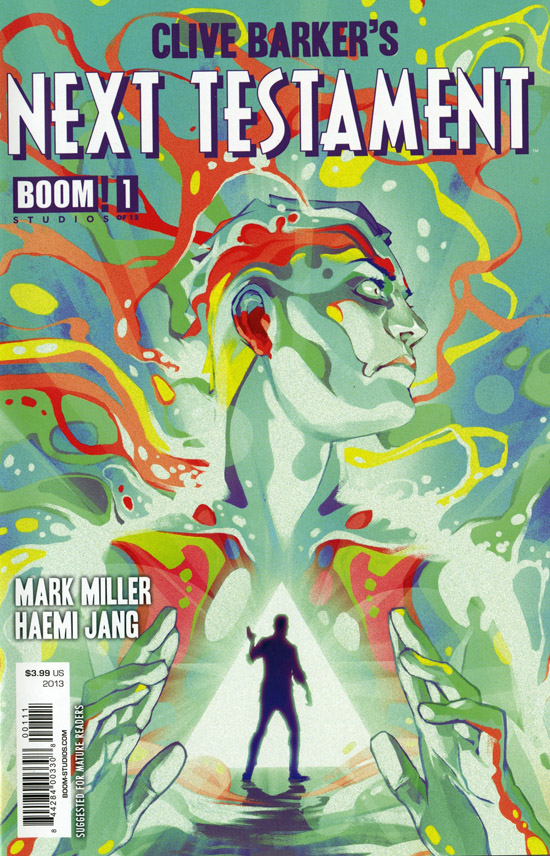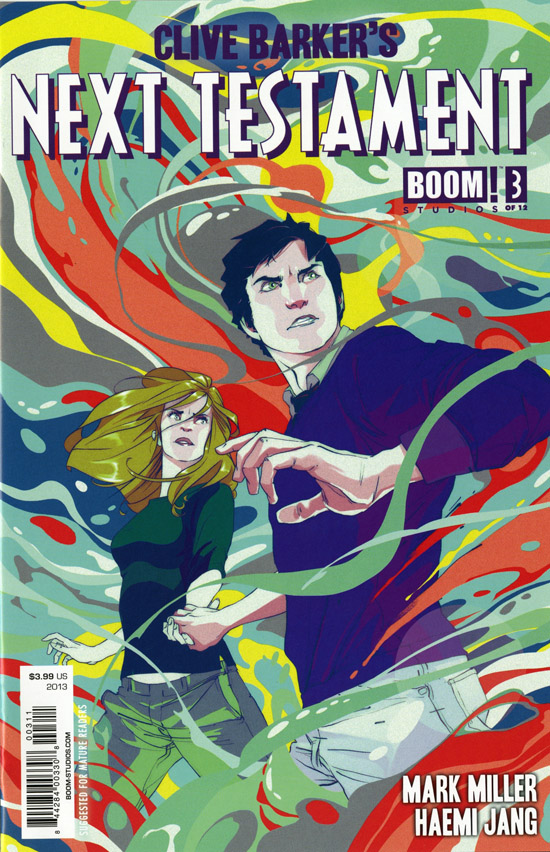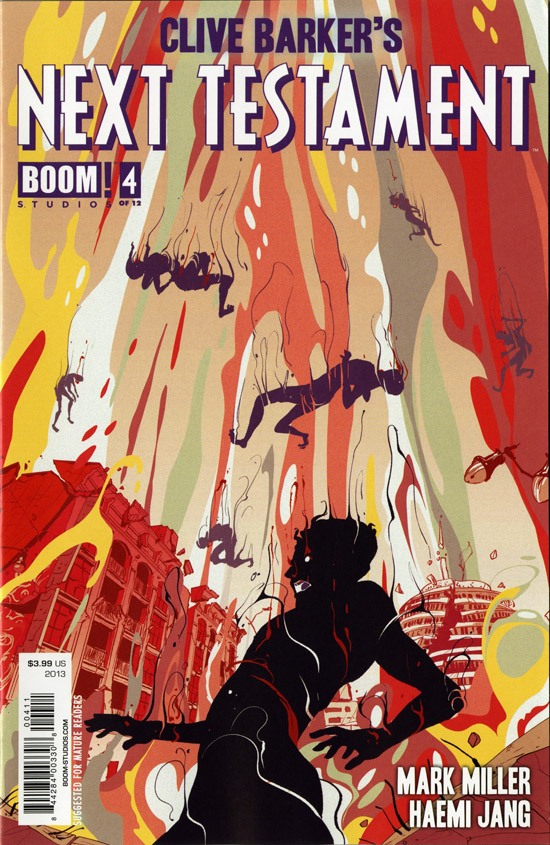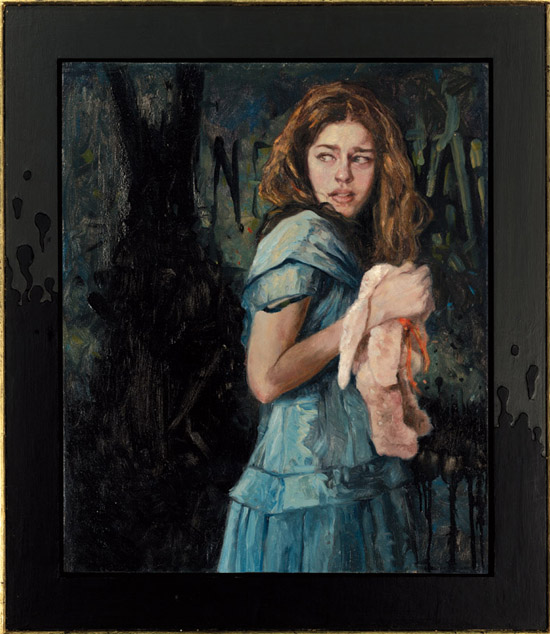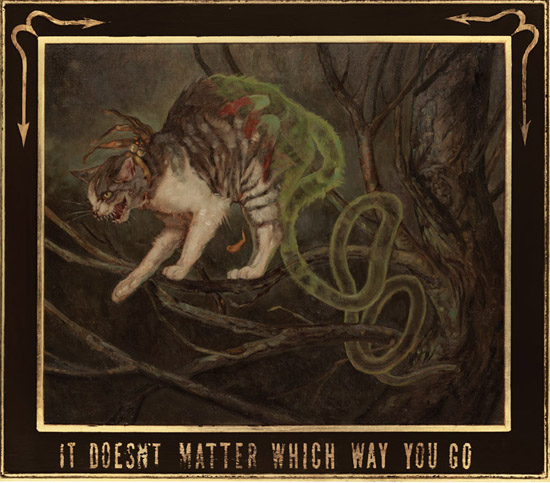A very special winter’s tale (with a frosty bite in it) written by Robert Ropars for SuicideGirls feat. Gogo, Lass, Sash, and Radeo.

[Above: Gogo Suicide in Mononoke]
On a dark and bitterly cold winter night in Scotland, snow fell and the wind howled. Several members of the SuicideGirls headed north from Dumfries to the massive Forest of Ae. As they traveled along the A701, Lass, Gogo, Sash and Radeo shared coffee while they laughed, sang and tried to stay warm.
Lass was somewhat familiar with the area, but Gogo helped navigate with both a map and her phone’s GPS. She frowned and turned the map around and back again while taking a drag on a cigarette. Lass reached out and Gogo passed it to her. Lass refocused on the road, took a drag and exhaled. Gogo meanwhile repositioned the map so it made better sense and saw they were near their next turn.
“A few more miles than turn left onto Hillview. It’s just before the river…the…Water of Ae? Seriously? The Forest of Ae? The Water of Ae? What’s next, the Village of Ae?”
Lass smiled as she took another drag and handed the cigarette back to her friend.
“Follow Hillview up from the highway.” Lass continued to smile and reached for her coffee.
Gogo traced her finger along Hillview which ran north from the A701 and parallel to the river known as the Water of Ae.
“Fuck me….Ae Village…Not too original around these parts. Where’s the Hill of Ae? Are we staying at the B&B of Ae?”
Radeo was asleep; her head resting on Sash’s left shoulder. Sash smiled at the conversation in the front and drank her own coffee. She moved slowly and carefully so as not to wake Radeo.
Lass turned briefly to Gogo as they turned onto Hillview.
“I told you were staying at a friend of the family’s cabin in the woods. Our guide is waiting to take us there and we’ll have all weekend to shoot.”
Gogo frowned at Lass and looked out her passenger window at the water. It glistened sporadically as the light of the full moon was obscured by the winter storm. She sighed, at least it was going to be a quiet weekend, but the snow seemed to fall faster now and she worried about being trapped in the cabin. A cabin deep in a huge forest in the middle nowhere.
As Gogo turned to look at the road which was less traveled than the main road they had just left, she could see the snow had started to make things messy and Lass had some trouble keeping the car steady. To relax she drank some coffee, finished the cigarette, and again looked at the map. She used a small flashlight to hunt for interesting village names and realized that the Forest of Ae was massive and the nearest cities were miles in every direction. She felt decidedly less relaxed and sighed.
Gogo looked back at the road ahead illuminated by their rental car’s headlights. With a glance at the map, she estimated that they were passing Crow Wood which lay opposite the road on the other side of the river. Unseen in the snowy darkness beyond and north of Crow Wood stood Wood Hill From the map it appeared to be a large hill and she made a mental note that they should check it out in the morning. Ahead she could just make out lights which had to be Ae Village as it finally came into view.
Sash gently woke Radeo who stretched and yawned before rubbing her eyes.
“Are we there yet?” Radeo asked with an impish grin.
The other three turned and looked at her and smiled.
“Well I guess someone had to say it at some point,” said Sash. She gave Radeo a kiss, handed her some coffee and a cigarette all of which she accepted gratefully. Radeo briefly remembered a video they had made together a few years ago for the site and felt much less cold.
“We’re coming into the village now. The guide should be waiting for us at the pub,” Lass said.
The girls stretched and started to gather their stuff together.
*****

As they entered the tiny village of Ae, they were all happy to have reached their destination as the wind and snow had increased noticeably. Lass checked her phone and scrolled to the text message she’d received the day before.
“There should be a small pub on the left by a parking lot…there it is, the Elephant & Tower.”
She drove past the pub and parked in its nearly empty lot. As they got out, their footsteps scrunched in the wet snow that was already nearly an inch thick. They gathered themselves up and fought the cutting wind all the way to the pub. Though it wasn’t that far away, the winter weather made it seem to take much longer.
The wind caught the door as they pulled it open and it slammed against the exterior with a thud. They struggled to pull the heavy wooden door back into position and enter simultaneously. The bartender and a handful of patrons all stared in disgust at the blast of cold air and snow that accompanied the four girls into the pub.
All four scanned the room, saw a massive stone fireplace and practically fell over each other to get to it. They shivered while they stamped their feet and quickly recovered with the heat of the fire. The smell of smoke, the popping and crackling of the wood was comforting to them. The people in the pub returned to their drinks and except for the bartender paid them no further attention.
Lass approached the bartender, ordered drinks for them, and asked if Angus was there. The bartender looked at Lass and the others with a mixture of wonder and amusement. They were without a doubt the oddest group to visit their small village in his memory. Tattoos and piercings weren’t a common site in Ae, in particular on a lady. He felt sure he would remember this day for a long time. From behind him a throat cleared and reminded him that his wife as usual was unamused.
“Aye. That’s Angus in the corner. But what business could ye four have with ‘im?”
“We’re with the SuicideGirls. We’re going to shoot each other at my friend’s cabin in the woods.”
With that Lass scooped up the drinks with a wink and lead the other three to the table in the far corner.
“What did she say?” asked the bartender’s wife.
Crossing himself he turned to her and hugged her.
“They’re planning to shoot themselves in the woods. One of them suicide pacts you read about online.”
She looked in horror at the four girls who seemed happy as could be. Sash caught her eye and smiled.
“Shouldn’t we call someone?”
“Woman it’s not our business what strangers do outside our village. Say your prayers tonight that God enlightens them, but we won’t mention them again after they leave.”
“Aye.” The bartender’s wife crossed herself and muttered as she walked into the kitchen.
Meanwhile the four approached the man in the corner table. He was tall, bearded and had a face that seemed to consist of more wrinkles than anything else.
“Are you Angus?”
The man who had been eyeing them since they entered nodded.
“I’m Lass, that’s Gogo, she’s Sash and that’s Radeo.”
He looked from one to the next with no visible reaction. He might have just reviewed livestock at the county fair.
“So we’re anxious to get to the cabin before the storm picks up much worse. Is it far?”
“Yes…and no. Sit and finish your drinks while I finish mine. There’s plenty of time before it’s too late. Can tell by how my knee feels.” He patted his right knee while he spoke.
The girls looked at one another, shrugged and sat down to drink their ale. It helped warm their insides so they didn’t have much reason to argue.
“Are you four sure you want to stay at that cabin…in those woods. On a night like this of all nights.”
“The cabin belongs to a friend of my family. Well belonged. She passed a few years ago.” Lass paused to take another sip of her drink.
“Is that so?” The fire in the hearth behind them cast all manner of shadows over him. They crawled like fingers over his cragged facial features.
“Yes. It’s a small place as you know, but perfect for our needs. How far a drive is it from here?”
“Drive? Not far, few minutes from here is a place to park. Rest of the way you need to go on foot. There’s not much of a path so I’ll take you there and you call me when you’re ready to leave.”
“Can we go soon? We’re anxious to get settled before the storm gets worse.”
The man eyed them each in turn.
“You do know about the wolf.”
Gogo paused as she lit a fresh cigarette, one brow raised.
“Wolf?” Gogo’s totem was the wolf so she was all ears. Radeo and Sash each paused drinking and stared nervously at the man.
“It’s just a fairy story…” Lass smiled at the man with a look that barely hid the condescension in her voice.
“NO!” He yelled and the entire place fell quiet and turned to stare at the far table. For a few moments only the sound of the wind as it howled through various cracks and crevices in the old pub could be heard.
“It is no fairy story lass. It was the wolf that killed your lady friend. She was dragged into the forest from that very cabin never to be seen again. The only trace was a trail of blood and torn clothes and wolf tracks larger than any seen before or since.”
Lass grabbed a freshly lit cigarette from Radeo, took a drag and exhaled.
“My father told me she died in an accident while hiking.”
“Your father didn’t want to scare his wee daughter it sounds like. I’m asking you again, will you change your mind.”
Lass took another drag and through slowly blown smoke made eye contact with each of them. She suddenly smiled.
“I’m game. I still think it’s just a story and how exciting to be shooting in a scary place in the woods, with a wolf on the prowl.” Gogo laughed as she pronounced “wolf” with a “v” sound.
“I see you’re as obstinate as your family friend. I had to warn you. Get your things and let’s go at once so I can return to this warm fire as soon as possible.”
With a nod to the pub owner and his wife, he lead the girls out of the pub and into the strong wind and snow. They finished their cigarettes quickly and jumped into their car. The man started his car and they followed him south out of the village on a small road and then turned west on another.
Soon their lights panned across some buildings as the road ended and a driveway ran in front of them. He led them to the far end and stopped. They did the same and got out and gathered their backpacks and other luggage. After a few minutes they were ready and followed him along a faint path.
Despite the full moon above and their flashlights, they were barely able to see thirty or forty feet in any direction. The man moved with speed and confidence, clearly he knew the way. Within fifteen minutes, the path bent northwest and they soon approached a wall of trees. Soon they followed the dark path and the trees above hid the moon from them.
They shivered both from the cold and the trees creaked in the wind. They struggled to keep up and manage their belongings as their guide moved almost too fast. Occasionally, and with great irritation, he paused so they could catch up.
After ninety minutes, he stopped and pointed ahead. They all stood and stared into the darkness and at first saw nothing. Then one by one they realized that in the inky black ahead was a small clearing and cabin was barely visible in silhouette against the trees behind it.
“Your castle awaits ladies. The key is under the mat.”
“You’re not coming in?”
“It’s late and the snow is falling faster. I must turn back.”
The girls looked at each other nervously but what could they do? The man tipped his hat and turned without another word and soon faded from sight behind them. They started forward again as they shivered and their hearts raced. It seemed to take a long time to reach the cabin, unlock the door and get inside. But at last they were safe.
*****

Hours later, the girls were huddled in front of a roaring fire as they drank coffee, shared cigarettes and shivered. Though the cabin was sturdy, the wind outside was still able to rattle the doors and windows. Lass had brought some marshmallows and they dipped them into the flames, let them ignite, slowly burn and blew them out when they were nice and crispy.
“I haven’t had roasted marshmallows in years,” said Radeo.
“So good,” Sash said with a smile as she consumed another one.
Gogo stood and headed towards the kitchen to grab a bottle of wine. She selected a red and as she started to turn she glanced out the window over the sink. A security light on the rear of the house did its best to illuminate the small back yard and dense pack of trees that filled the view beyond. Gogo felt a pang of fear and stared at the trees directly out from the window. She had thought she’d seen a shadowy figure move behind a tree and out of view.
She waited and saw nothing but snow whipped on the wind and the branches of trees that swayed like giant arms with long bony fingers. After a few moments, she convinced herself her imagination had gotten the best of her. Gogo looked to her left she saw a door that lead from the end of the kitchen to the back yard. She walked over, turned the deadbolt and fastened the chain lock. Now that she felt more secure she returned to the main room, bottle in hand. Outside, one of the shadows between the trees moved quickly and against the wind.
“What took you so long?” Lass saw something odd in Gogo’s face.
“It’s nothing… I spooked myself. I thought I saw someone in the woods, but it was just shadows.”
The words had barely left her full lips when the sound of the wind was drowned out by a sudden, unearthly howl that vibrated in their chests. The four girls looked at each other with wide eyes.
“What the fuck was that?” Radeo stood and started to pace nervously.
“The wind?” Sash sounded like she didn’t believe herself.
“You’re right, what else…”
Another howl erupted from somewhere in the woods but closer. It was unmistakably the howl of a wolf. Though none had ever actually heard a wolf howl in the wild it sounded like it was coming from something enormous. They huddled together by the hearth in the center of the room as every sound seemed magnified a hundred times.
“Is there a weapon in this place?” Radeo tried to think logically.
Before anyone could answer, they heard a crash and loud noises from the woods beyond the front door. As they clung to each other, Gogo’s curiosity got the better of her. She broke from the others, put down the wine bottle she still had in her grasp, and slowly approached the front door.
“Gogo get back here!” Lass was terrified and didn’t really want to know what was outside the front door.
Gogo made her way to the door and then slowly inched over to the one window on the front of the cabin. It was small and to the left of the front door. Slowly her left eye passed the edge of the window and she could see the front yard. As in the back, a single security light cut through the darkness. She could see heavy snowfall, the surrounding trees and the full moon barely visible in the distance just above the tree tops.
Nothing else seemed to move and she felt relieved when she saw something strange. The ground was covered with several inches of snow undisturbed like a blanket in front of the house. But there was something else. A set of large tracks came from the woods almost out of view to the right. Gogo felt fear rise again inside her and her heart started to race. The tracks lead to the front of the house to the right and ended out of view. She took a step back and froze when she heard what sounded like a growl and movement along the narrow porch.
She turned to her terrified friends and pointed to the front door and said quietly “There’s something out there.”
All three stared past her as their eyes grew wider and Lass screamed.
Gogo’s head whipped around to see a massive black wolf’s head in the window. Its fangs exposed, it had the look of a hungry smile. Gogo stumbled backward and the wolf’s head arced back and let out another howl. Now much closer to them, they covered their ears and screamed. Gogo made it back to them and they huddled together as the wolf finished, turned once more to them and darted past the window out of sight.
“What do we do?” Radeo shivered and Sash held her tightly.
Gogo and Lass looked at each other and shrugged.
“We stay in here where it’s warm and safe.”
A sudden bang from the rear of the house made them all jump and scream. Something had just struck the back door, but the solid wood appeared to hold. From the darkness, another howl erupted and seemed to swirl in the wind around them. For the next few minutes they heard scratches, thuds and more howls all around and above them.
They then heard sounds from the front porch that came to a stop outside the front door. They thought they could hear the massive wolf sniff around the frame and they began to back away through the room to the kitchen. They had to stop and cover their ears as another ear-shattering howl shook the room. This was followed by a heavy thud against the front door.
The wolf charged and battered the front door and they scrambled into the kitchen to find a weapon or escape out the back into the woods if needed. Before they could say or do anything, the front door crashed open. Gogo couldn’t help but peek around the corner and saw a giant black wolf in the doorway, steam coming from its nostrils. Bitterly cold wind and snow burst through the room around it.
At that moment, the back door burst open and someone entered in a rush. It was Angus with a large axe in his right hand.
“I told you girls not to come here. Just like your friend. She wouldn’t listen either and I had to make her leave.”
The girls’ brief excitement to see him quickly faded. His last words hung in the icy air and frightened them. His eyes turned completely black and as he smiled a mouth full of fangs was exposed.
“I thought I took care of her that night, but she got away. Tonight I’m going to take care of her once and for all. These are my woods not hers. But first, I’m going to deal with you four.”
As they watched, his hair grew longer and his features altered until before them stood a man that was a wolf, but still a man. His height and muscles had both increased and he towered over them. He let out a howl and lifted his axe. The girls screamed and turned to be confronted by the black wolf. It stood in the doorway with hackles raised, ears down low, and massive fangs exposed. The girls were trapped and hugged each other tightly.
The wolf ran towards them and Lass who was closest screamed. Without thinking, Gogo pushed her friend away and swung at its face with a fist. The beast was too fast for her and caught her hand in its jaws. Gogo screamed and the wolf locked eyes with her. Gogo felt a stabbing pain and then a sudden rush of heat running through her entire body. She collapsed and the wolf released her hand. The others rushed to her and looked from one attacker to the other. The wolf turned its head to one side seemingly confused and then turned to the man wolf with a growl.
He had watched all of this with apparent glee and barked at the wolf. The wolf braced itself and launched at the man wolf. They collided and fell through the open rear door and into the yard. Sash ran and watched the epic battle rage back and forth and then into the woods. For a few minutes they could all hear crashes and howls from the darkness.
Then a violent shriek filled the air. Sash watched as a figure emerged from the woods. The man wolf walked towards them, axe slung on his right shoulder and she could see he carried something in his left hand. Sash backed away and joined the girls on the floor by Gogo. A moment later he entered, covered in blood, terrible wounds and torn clothing. He put the axe down and smiled as he lifted the bloody head he carried.
Lass screamed as she saw the dead eyes of her family’s friend and gaping mouth. Angus threw the head at them and it landed just beyond and bounced across the floor. The girls cried and screamed as the man picked up his axe.
“Now where were we? I’ve worked up such an appetite.”
Gogo’s eyes snapped open and she gasped. The girls turned to her in shock as she sat up. The man paused in confusion and watched with anger as Gogo changed before all of them. Her eyes turned completely black, her body grew in height and muscle, and her teeth and nails extended. She leapt to her feet, stretched and looked at Angus as she began to growl. The sound rumbled in the other girls’ chests.
“I feel…strong…”
“You bitch… I’m going to tear all of you apart!” Angus barked and glared at her enraged.
He opened his mouth to say something more, but Gogo leapt and landed on him. Her mouth opened she dug deep into his neck tearing it open. Blood sprayed her face and the walls as she hopped down and grabbed him with long nails that dug into his chest. She spun him once and tossed him with ease into the backyard. She picked up his axe and ran out after him.
The girls watched from the doorway as she finished him off with a whirlwind of axe blows. Finished, Gogo dropped the axe, lifted her head and howled at the moon. Turning, she made her way back to them, and the girls backed away in fear. Smiling she approached and kissed each one in turn.
“I need a smoke.”
She left them and returned to the main room, sat in front of the fireplace, lit a cigarette and took a deep drag before she slowly exhaled towards the ceiling. She turned to her friends who watched from the kitchen doorway and smiled lustfully.
“So…who’s afraid of the big bad wolf?”
One by one the girls approached nervously. Gogo smiled, finished her cigarette and looked from one to the other. The winter air howled around and through the house. Their screams were barely audible over the wind. Soon Lass, Radeo and Sash would awaken and Gogo would lead her pack out and into an unsuspecting world.
THE END

“Lupus in Fabula” is Latin for “Wolf in the Fable.”
Robert Ropars (@RobertRopars) is a Chicago based horror author, liberal/progressive, Doctor Who fanatic and bullying surTHRIVEor. You can read more of his stories via Amazon, Kindle and Nook. For more, visit his WordPress Library.
Related Posts:
Fiction Friday Halloween Special: Suicide Girls – Augmented Reality





